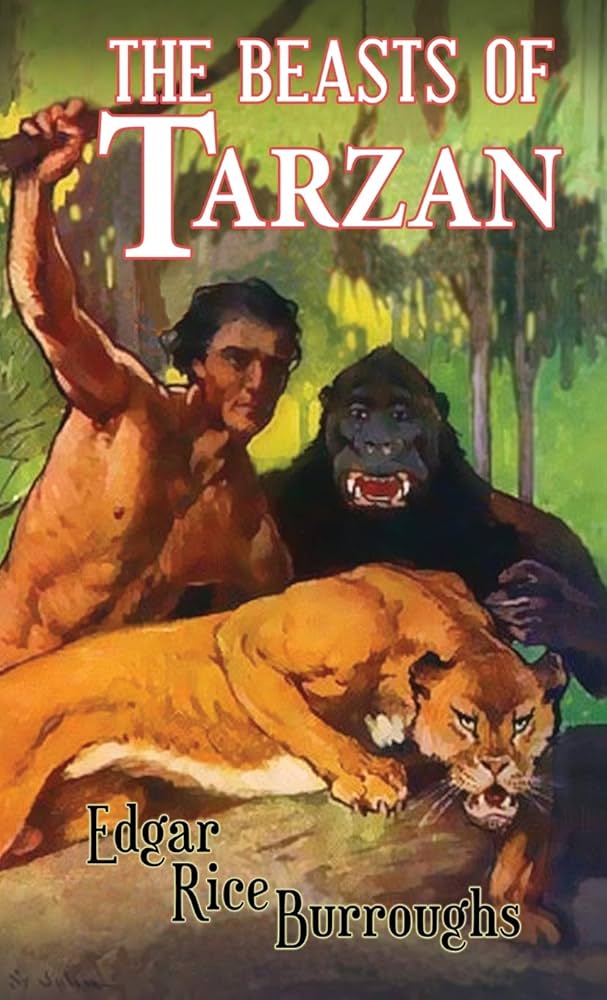Chapter 17 — The beasts of Tarzan
byChapter 17 — The beasts of Tarzan unfolds with Mugambi steering a dugout canoe along the winding river, accompanied by a native woman and the fierce beasts loyal to Tarzan. Traveling silently under the night sky, they glide swiftly through the dark current, their mission singular—to return to Tarzan and aid him. The wild energy within the canoe is barely restrained, with the animals restless but instinctively aligned with Mugambi’s calm authority. Suddenly, a surprise encounter disrupts their stealthy passage as they collide with another canoe occupied by men loyal to Rokoff. A flurry of confusion erupts, gunshots ring through the night, and the startled animals snarl in chaos. The violence of the moment echoes across the water, summoning the attention of Tarzan, who is nearby but unaware the “Kincaid” has already moved downstream.
As the echo of gunfire slices through the stillness, Tarzan quickly abandons his position and rushes toward the disturbance. His trained senses read the direction and urgency of the sounds, leading him closer to danger. At the same time, the “Kincaid” has floated unexpectedly due to the river’s shifting currents, its course altered by an eddy, placing Jane Clayton once again in peril. She stands on the vessel, unaware of how close her rescue is or the looming conflict that will decide her fate. Tarzan, now fueled by worry and rage, arrives in time to confront the situation unraveling before him. The battle that ensues on the deck is swift and ferocious. With Mugambi’s warriors and the savage beasts fighting at his side, Tarzan seizes control.
Among the panic, Rokoff tries to reclaim dominance but fails to inspire loyalty. His cowardice becomes visible to all, his voice trembling as he commands retreat. Realizing his fall from power, his own crew turns against him. In a chilling moment of justice, Rokoff is hurled from the vessel into the shadows of the jungle. There, Sheeta the panther awaits—her fangs delivering a judgment that years of confrontation had been building toward. Tarzan watches, not with pity but with satisfaction, understanding that fate often meets cruelty with a mirror. Jane’s presence tempers his wrath, ensuring the safety of the crew takes precedence over personal revenge.
The battle subsides, but the consequences linger in the silence that follows. Jane is finally safe, though exhausted by the string of threats she has endured. Around her stand Tarzan, Mugambi, and the now-dispersing beasts, their bond forged in the crucible of the wild. The ship’s survivors stare in awe at the strength and intelligence that Tarzan commands. As order returns, the emotional weight of the journey sets in—each of them changed by what they’ve faced. Though victory has been earned, the jungle never truly releases those who walk its depths. The group silently prepares for what lies ahead, knowing survival is only momentary respite in their unpredictable world.
The chapter captures the relentless tension that defines Tarzan’s story, highlighting themes of loyalty, justice, and instinct. It is not only a tale of survival but of identity—how every character, beast or human, reveals their true nature when tested by the wild. Tarzan’s restraint in sparing Rokoff from his own hands speaks volumes of his evolved morality, shaped by his love for Jane and the wisdom earned through hardship. This moment also reflects the dichotomy of man and beast—how Tarzan stands between both worlds, capable of violence, yet governed by purpose. With Rokoff gone, the threat that haunted them is finally extinguished. Yet the scars, both physical and emotional, will serve as permanent reminders of the jungle’s law: only the strong endure, and those without honor perish.

